Home / Magazines

Education Business 29.02
This issue of Education Business magazine reviews January 2024's Bett Show, which showcased the latest innovative technology that can transform teaching practices and streamline school operations. We cast our minds back to the inspiring speakers and cutting-edge technology on show.
The new Electric Vehicle charging grant that has been developed especially for state funded schools is also covered. We examine what the grant is, how to apply for it, and what to consider before embarking on a charging infrastructure project.
Elsewhere, this issue investigates the condition of the school estate by delving into a report by BESA, which looked at almost every aspect of school buildings, such as the quality of PE equipment and music facilities.
This issue also covers workplace inclusivity, fire safety, security advice, mental health, and much more.
Angela Pisanu, editor
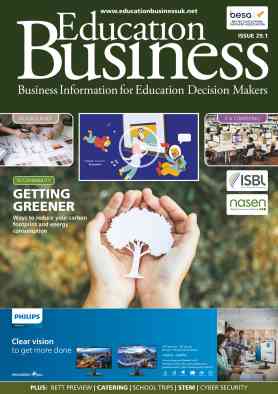
Education Business 29.01
Welcome to the first Education Business magazine for 2024.
With the Bett show promising to showcase the latest education technology and host a range of inspirational speakers, we take a look at what visitors can expect from the event this January.
Exploring the topic of technology further, Becci Peters from BCS, The Chartered Institute for IT, shares how schools can improve their computing provision by focusing on teachers, the curriculum, and extracurricular activities.
Sustainability is covered too, with Eco-Schools sharing their advice on practical ways that schools can reduce their impact on the environment and cut energy usage.
There are also informative features on modular buildings, school trips, cyber security, catering, and more.
I hope you enjoy the issue.
Angela Pisanu, editor
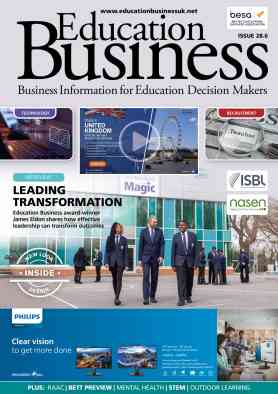
Education Business 28.06
Welcome to this issue of Education Business magazine, where we interview James Eldon, Principal of Manchester Academy, who won our very first EB Leadership accolade at the Education Business Awards this summer. James tells us about his approach to improving outcomes at the school – which went from ‘inadequate’ in 2012 to ‘good’ three years later.
The magazine also delves further into the issue of unsafe concrete in schools, examining the latest RAAC guidance, as well looking at how some schools are handling the disruption.
Elsewhere, Alex Green, Head of the Let’s Go Zero campaign, discusses how schools can get a helping hand on their decarbonisation journey, and Emma Hollis from the National Association of School-Based Teacher Trainers, examines how the teacher recruitment crisis can be tackled longer term.
On the topic of education technology, Al Kingsley, chair of Hamptons Academies Trust, discusses the importance of putting the needs of learners and staff at the heart of a school's digital strategy, and we also look ahead to Bett 2024 to see what inspirational speakers and content have been confirmed.
Angela Pisanu, editor

Education Business 28.05
This 'Back to School' issue of Education Business magazine is published during more turbulent times for the education industry, with some schools having to move to remote learning due to the presence of unsafe Reinforced Autoclaved Aerated Concrete (RAAC)being confirmed in their buildings.
Indeed, the National Audit Office warned back in June that an estimated 700,000 children are being taught in ageing or unsafe school buildings in England.
This is a situation that will take time to remedy. But Jackie Maginnis from the Modular and Portable Building Association, shares how a volumetric approach could help fast-track improvements to the school estate and speed up the school building programme.
There's also information on the government's Public Sector Decarbonisation Scheme, which provides funding and support to education settings that want to become more energy efficient and sustainable.
This issue also focuses on transformative education technology, given the rise in popularity of generative artificial intelligence, such as ChatGTP. Dr Neelam Parmar examines the impact this technology will have on our education system, and Claire Penketh from BCS, The Chartered Institute for IT, discusses the pros and cons of using AI in education.
We also examine other technology trends that are making waves in education, such as gaming and virtual reality - examples of which can be seen at Bett UK in January 2024.
I hope you enjoy the issue.
Angela Pisanu, editor

Education Business 28.04
Welcome to July's issue of Education Business magazine, which comes shortly after our annual Education Business Awards where we celebrated the successes, hard work and dedication of the sector.
This issue will take a close look at our award winners, including those of our new categories in leadership, business management, and educational resources.
We also cover the topic of school buildings, given that there is rising concern over the safety of England’s school estate. We look at a report from the National Audit Office which shows that around 700,000 children in England are studying in schools that require major repair work.
Elsewhere in the magazine, Mark Martin, assistant professor in computer science and education practice, shares his thoughts on whether the current teaching provision of computing and programming is effective enough, and how it can improve.
And, we also cover the topic of fire safety, with the National Fire Chiefs Council explaining why effective sprinkler systems are vital for protecting schools against the risks of fire, along with other measures, such as fire alarms and fire doors.
Angela Pisanu, editor
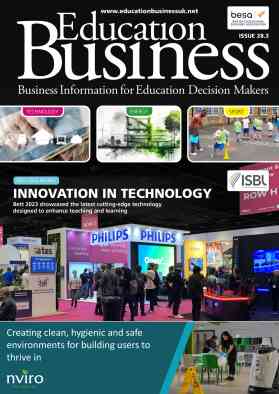
Education Business 28.03
Technology to elevate teaching and learning
A walk around this year’s Bett show in March was an impressive eye-opener to just how much technology there is to help the education sector. From solutions that improve lesson-delivery, to the quirky tech that really inspires pupils, there was something for every need, as outlined in our Bett review on page 35.
With the sheer amount of education technology available though, it can often be overwhelming for schools who do not have the time or money to get any EdTech investment wrong. On page 27, Al Kingsley explores the importance of aligning EdTech purchasing with a schools’ unique needs and how to ensure that schools get the most out of their investment.
The increase in schools falling victim to cyber attack shows how the education sector – and the vast amount of data it holds, is a desirable target for cyber criminals. This edition of Education Business signposts the free tools and resources available to schools to help them become more resilient, on page 43.
Sustainability and the environment continues to be high on the agenda, with a government ambition for the sector to be net zero by 2030. With a massive transformation needed to hit the goal, Dr Sally Uren, chief executive at Forum for the Future, offers some advice on the first steps that schools can take. We also look at how new buildings constructed under the School Rebuilding Programme are to be net-zero and resilient to climate impacts, on page 21.
Angela Pisanu, editor
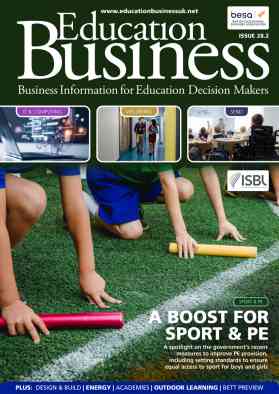
Education Business 28.02
Investing in sport & PE
The government has announced a raft of measures and funding to improve the provision of sport and PE, including £600 million to continue the PE and Sport Premium for another two years.
To ensure equal access to sport – something the Prime Minster Rishi Sunak promised to the Lionesses following their win at the Women’s Euro 22 – the government has set out standards to ensure girls and boys are offered the same sport options at school. What’s more, the government is advising that at least two hours of PE is done a week, and says that it will provide details on how to support schools in its soon-to-be refresehed School Sport Action Plan. These measures to improve sport and PE are analysed on page 69.
This issue of Education Business also examines effective strategies for MAT growth, as well as the mental wellbeing of the school workforce and what school leaders should be aware of. Meanwhile Victoria Temple from BCS, The Chartered Institute for IT, takes on the topic of ChatGPT and the rise of AI in schools, discussing how teachers can harness its potential.
Finally, with the government admitting that serious structural issues have been identified in a number of schools, we examine the issue and summarise what support is available to improve the condition of school buildings.
Angela Pisanu, editor
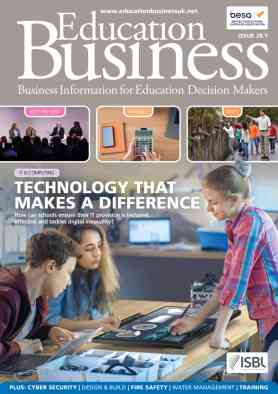
Education Business 28.01
Will 2023 be a smooth ride?
2022 was another turbulent year. With three prime ministers and five education secretaries, the unsettled political situation caused further upheaval for a sector that was still feeling the effects of the pandemic.
So what does 2023 have in store for the sector? The Department for Education, at least, seems settled, with Gillian Keegan in place as education secretary and the return of some familiar DfE faces – Robert Halfon and Nick Gibb. But of course, challenges remain, namely funding, the cost of living crisis, teacher recruitment, catch-up education, and so on. And there have not been many announcements from the DfE to truly understand the direction of travel for the sector.
In his first speech of 2023, the prime minister Rishi Sunak set out his new ambition of ensuring that all school pupils in England study some form of maths to the age of 18. This is to counter poor numeracy levels; figures show that around 8 million adults in England have the numeracy skills of primary school children. The prime minister has, however, acknowledged that it will take time, so realistically, it won’t be in place until 2025.
In this issue of Education Business, Niel McLean, head of education at BCS, The Chartered Institute for IT, looks at how schools can ensure that their IT provision is inclusive, effective and tackles digital inequality. Meanwhile Gareth Jelley from edtech charity LGfL-The National Grid for Learning, shares his top tips on how to prevent a ransomware attack. We also look ahead to Bett 2023, which will once again gather the global education community to explore and learn about the latest education technology.
Angela Pisanu, editor
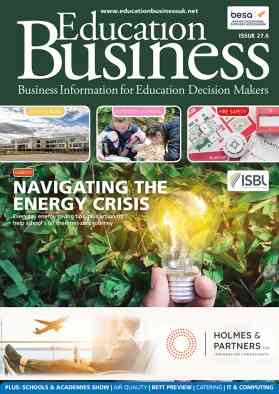
Education Business 27.6
With five education secretaries in four months and a changing ministerial line up, the Department for Education has experienced upheaval since September. But it seems to have settled now, with the ministerial line-up confirmed by prime minister Rishi Sunak.
Gillian Keegan is now the education secretary, and the DfE sees some old faces return, such as Nick Gibb and Robert Halfon. Read our summary of who’s who in the new-look Department for Education, as well as Rishi Sunak’s likely direction for education, on page 15.
With the energy and cost of living crisis upon us, Suzanne Gibbon from the Let’s Go Zero campaign shares everyday energy saving measures for schools, and explains how the campaign is lobbying for the government to support schools in their net-zero ambitions, on page 19.
We also look at the impressive Glebe Farm School – a fossil‑free new build school in Milton Keynes. It’s so ‘green’ that it’s been removed from the grid and even its Bunsen burners are powered without gas. The school’s headteacher, Matthew Shotton, explains the project on page 23.
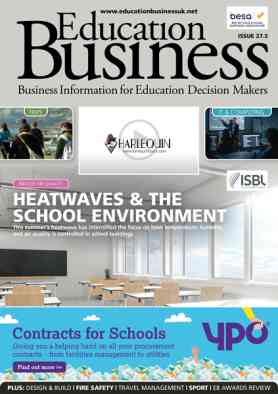
Education Business 2705
Heatwaves and the school environment
The UK’s heatwave earlier this summer disrupted the end of term, with some schools finishing early, cancelling events or moving to online learning.
The extreme heat brought into sharp focus both the issue of climate change, and the importance of having a healthy indoor environment for pupils and staff in schools.
The Building Engineering Services Association (BESA) tackles the subject on page 49, looking at links between air quality, temperature and Covid-safety controls within school buildings.
The government’s sustainability and climate change strategy for education says that not only will all new DfE-delivered school buildings be net zero in operation, they will be designed for a 2oC rise in average global temperatures and future-proofed for a 4oC rise. This is so they are resilient to the risks of climate change, including increased flooding and higher indoor temperatures.
Richard Hipkiss, development director of the Modular and Portable Building Association (MPBA), takes on the subject of greener school buildings on page 40, and makes a case for volumetric manufactured buildings in shaping a net zero future.
Angela Pisanu, editor


